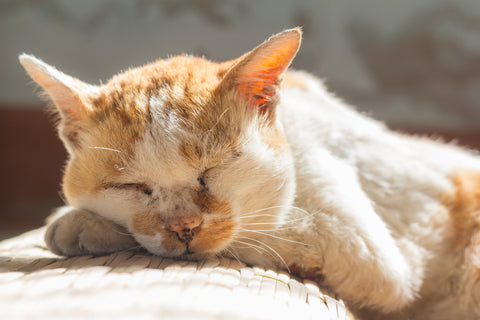
5 steps to taking care of your elderly cat
We love our cats. Whether we’ve cared for them all the way from their cutest fluffy kitten stage into old age, or we’ve given a home to an older cat who needs love and care, they become part of the family and we want to make sure they’re happy, healthy and independent for as long as possible.
To help you give the right care for your senior feline friends, we’ve put together this easy guide with 5 steps to taking care of your elderly cat.
How old is your cat?
Did you know that cats age quickly in their younger years and then plateau? Research suggests that a one-year old cat is the equivalent of a 15-year-old human. By the time your cat is three, he or she will be the same age as a 25-year-old human and after that, it’s roughly four cat years for every one human year.
So, by the time your cat is 10, they could be nearing 60 human years old – and they’ll have all the same creaks and groans that we’d associate with getting older. As a dedicated cat-parent, we need to look out for these signs and adjust the way we care for our older cats accordingly.

Here are the five top things to look out for:
1. Eating less
Studies show that both taste and smell abilities reduce in ageing cats. This may lead to a loss of appetite and your cat eating less. You might want to consider specially-developed cat food for older cats, and you might want to put less food out. If you are going to change their diet, do it gradually and still put some of the old diet out in a separate bowl so that they have some choice. If you notice your cat is losing weight, it’s always best to pop to your vet for a check-up.
2. Getting chilly
We know cats love the warmth at any age, but older cats get colder as their coat thins and their internal body thermometer gets less efficient. You can help keep your cat warm by investing in a warmer cat bed, and perhaps having several beds or blankets around your home so your senior cat can always find a snuggly resting place. Put beds by safe heat sources, such as radiators, for extra cosiness and avoiding draughts.
3. Less active
We’re used to cats jumping on our garden fences, leaping onto the sofa and chasing birds around outside, however, a sure sign of an old cat that’s feeling their age is a reduction in this kind of activity. This is usually due to stiff joints that make it harder to stretch, jump or pounce as easily, so it’s always good to provide extra support by giving them joint supplements for cats. Good supplements use high-strength ingredients such as glucosamine, vitamins and Green Lipped Mussel which help to promote healthy joints. Giving your cat a helping hand to reach her favourite perch by buying a ramp or moving her bed to somewhere more accessible will help too. Take a look at YuMOVE Cat – a supplement that uses high-strength, natural, quality ingredients to help support your senior cat’s stiff joints.

4. Getting grumpy
You know your cat’s personality better than anyone, so you’ll be able to spot if they become grumpy, less sociable and don’t want to spend time with you. If you detect a change in mood, it’s often a good idea to see a vet for a check-up, because there are certain things that vets will look out for as your cat starts to age. Your vet will also want to make sure your cat is up-to-date with vaccinations so that they’re as protected as possible.
5. Needs some grooming TLC
Cats have a spotless reputation for grooming themselves, so you’ll notice when this stops. There could be a number of reasons - older cats with stiff joints can’t reach to groom properly, so you may need to take over some of the grooming duties, including brushing and nail-trimming.
Caring for our cats as they head into old age is one of the most important and loving things we can do. Look out for the key signs of ageing, make changes to their diet, environment and care, and refer to your vet if you’re concerned. By doing so, you’ll be well on your way to giving your cat the perfect home for their older years.





